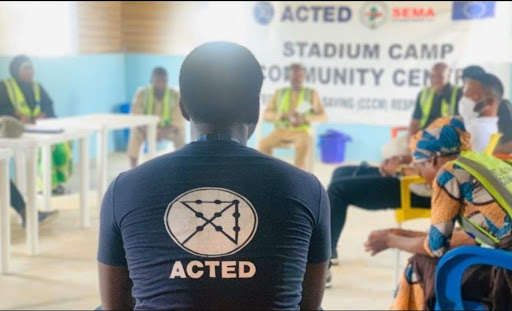NGO Suspension Obstructs Delivery Of Vital Humanitarian Services In Northeastern Nigeria
ACTED was suspended for organising training to prepare staff for deployment in high-risk areas of Borno State. Where aid workers and facilities face the threat of violent attacks.

The five month-long suspension of the Agency for Technical Cooperation and Development, commonly known as ACTED, by authorities in Borno State, Northeast Nigeria, has hindered the delivery of critically needed humanitarian aid services to vulnerable populations and the gradual shutdown of the organisation’s operations.
In June, HumAngle reported the suspension of International Non-governmental Organisations (iNGOs) by the Borno State government following a security incident related to the conduct of pre-deployment training and simulation exercises for employees.
The iNGO was carrying out the routine simulation exercise in Maiduguri, the state capital, for aid workers usually deployed to high-risk areas also known as deep field locations, when the sound of simulated gunshots and the appearance of a masked individual led to panic and law enforcement intervention.
According to the government, the suspension of the iNGO operation was a result of the discovery of toy guns and simulators in the venue of the training exercises. It added that residents near the hotel had reported to officials that they were hearing gunshots from the hotel, following which the police were notified.
In response to the ban, ACTED said the training was designed to prepare staff of the organisation to cope with unexpected security incidents, saying that its staff and partners have found themselves in very dangerous situations where their safety and security were severely compromised.
“These simulation exercises are standard procedures for many NGOs, both in Nigeria and globally and in no way, neither during those exercises nor during the delivery of assistance, does ACTED carry weapons, in line with international standards and its dedication to uphold principled humanitarian action,” it said.
The organisation highlighted some of the risks faced by ACTED personnel, including the killing of an ACTED contractor after being abducted in May 2020 between Maiduguri-Monguno road.
In March 2021, ACTED staff faced imminent danger during an attack while providing humanitarian assistance in Dikwa, and in April, the ACTED office and warehouse in Damasak were attacked and large stocks of humanitarian supplies destroyed.
HumAngle has learned from an internal source that the failure of the government to reinstate the organisation for the past 5 months has resulted in the closing down of ACTED’S operations in Borno state and the loss of jobs.
Recently the iNGO staff in Monguno, an important humanitarian centre in Northern Borno were notified their contract would not be renewed. Many more employees are likely to be laid off if the ban continues.
In 2020, ACTED supported 110,000 people in Borno with food and livelihoods assistance, and constructed more than 3,000 shelters. The organisation’s presence stretches to 15 camps in Borno State.
International humanitarian organisations in Nigeria’s conflict-ravaged Northeast often have tense relationships with authorities, particularly the military.
In 2019, Mercy Corps suspended its operations in Yobe and Borno after the army closed four of its field offices in the region. Similarly, in 2019, Action Against Hunger was ordered by the Nigerian Army to close its offices in Borno and Yobe States, accusing the aid actor of aiding and abetting terrorists.
In 2018, the military revised a ban on United Nations children’s agency (UNICEF) operations after accusing the organisation of deploying spies who support the insurgents and their sympathisers. Earlier in the same year, the military declared three UNICEF workers persona non grata.
In 2017, the military carried out a pre-dawn raid and forced their way into the main U.N. humanitarian base in Maiduguri.
Support Our Journalism
There are millions of ordinary people affected by conflict in Africa whose stories are missing in the mainstream media. HumAngle is determined to tell those challenging and under-reported stories, hoping that the people impacted by these conflicts will find the safety and security they deserve.
To ensure that we continue to provide public service coverage, we have a small favour to ask you. We want you to be part of our journalistic endeavour by contributing a token to us.
Your donation will further promote a robust, free, and independent media.
Donate HereStay Closer To The Stories That Matter




